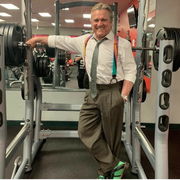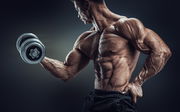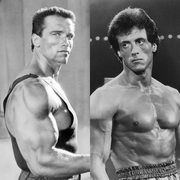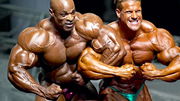

Testosterone boosters have gained a lot of popularity in the bodybuilding, fitness, and sports community. Athletes often aim for rapid muscle gains, but their effectiveness and safety remain subjects of debate. Several concerns, including issues with product quality, storage conditions, and potential side effects, raise questions about their reliability.
Watch What’s Trending Now!
Testosterone is a crucial male s*x hormone and plays a pivotal role in various physiological functions, including muscle mass development, libido, and overall well-being. And it’s naturally produced in our bodies. So why do we need boosters?
ADVERTISEMENT
Testosterone levels and its relation with men’s growing age
According to studies, as men age testosterone levels naturally decline, leading to potential issues like reduced s*x drive, fatigue, and decreased muscle mass. During puberty, boys change due to a hormone called testosterone, developing male features like muscles, facial hair, and a deeper voice.
Testosterone peaks in the late teens to early twenties. Into adulthood, testosterone usually stays stable, but around age 30, a gradual decline begins- normal aging, varying for everyone. In the mid-30s to 40s, testosterone may drop 1-3% yearly, affecting body composition, energy, and s*xual function. Older men, like those in their 70s or 80s, may have much lower testosterone levels, a natural part of aging impacting individuals differently. Furthermore, let’s dive into the benefits of increased testosterone levels. Testosterone aids in red blood cell production, contributing to cardiovascular health.
Top Stories
Retired for Almost Four Decades Now, Bodybuilding Legend Tom Platz Gives His Take on Modern Bodybuilding

Why Tadalafil Is Used in Bodybuilding: Is It Actually Safe and Effective?

Elite Powerlifter’s Viral Gym Prank Goes South as Two Jacked Guys Try to Throw Him Out of the Gym: “You Cannot Do This Here”

Was It Arnold Schwarzenegger or Sylvester Stallone Who Ignited the Physique Transformation Craze in Hollywood?

Jay Cutler vs. Ronnie Coleman: Net Worth Comparison Between Olympia Champions

ADVERTISEMENT
The potential benefit of testosterone’s higher level in the body
Many studies suggest that normalizing its level may reduce the risk of heart attacks and strokes. The other benefits include that it promotes muscle mass and increases fat reduction, aiding in weight control and boosting energy. combining testosterone therapy with strength training can enhance these effects.
According to reports, testosterone is vital for bone mineral density, reducing the risk of weak bones and osteoporosis. Clinical trials indicate increased bone density with its treatment. Higher testosterone levels are associated with better verbal memory, spatial abilities, and mathematical reasoning. Studies suggest a potential link between testosterone and cognitive function, including a reduction of Alzheimer’s disease. Also, lower levels are linked to a proper quality of life, including symptoms like depression and fatigue. Testosterone replacement therapy may improve mood.
ADVERTISEMENT
Highly anticipating benefits according to athletes is muscle growth. Testosterone or Androgen is a key factor in muscle development, influencing neurotransmitters, promoting tissue growth, and interacting with DNA receptors to stimulate protein synthesis. It also increases growth hormone levels, making exercise more effective in building muscle.
While anabolic-androgenic st*ro*ds (AASs) are synthetic derivatives of testosterone used by some athletes, their long-term use has been associated with various toxic and hormonal effects. Patrick Kelly, a YouTuber and High School teacher explained how testosterone works in muscle growth.
ADVERTISEMENT
Patrick Kelly’s analogy on testosterone levels
In a video uploaded on the Seeker channel, Kelly described how this hormone, plays a vital role in muscle growth. He illustrated the muscle structure, detailing myofibrils, satellite cells, and their response to tension during exercise. Testosterone, binding to muscle cell receptors, prompts protein creation, inhibits breakdown, and activates satellite cells. Kelly mentions factors affecting testosterone levels, like age and exercise. He mentioned the complexity, stating, “It’s much more complex than a simple cause and effect.” Do you know how a booster and therapy works to increase its level?
ADVERTISEMENT
If any individual is facing a deficiency of testosterone levels, they can consult a doctor. Doctors can give injections to people with low testosterone levels. There are also supplements called testosterone boosters that use natural ingredients to increase their levels when combined with a good diet and exercise. Research shows they can improve physique, energy, and enhancement in mood. However, a misconception often floats on the surface in the fitness industry that st*ro*ds and Testosterone Replacement Therapy (TRT) are the same.
ADVERTISEMENT
Chris Bumstead’s take on TRT and St*roids
To clear the air, five-time Mr. Olympia Chris Bumstead, in his latest interview with Patrick Bet-David and Vincent Oshana on the Valuetainment channel on YouTube, talked about the basic differences between them.
ADVERTISEMENT
Cbum recognized the difficulties in understanding substances like TRT and steroids, pointing out their distinct purposes. When asked how someone should start learning about stero*ds, the Canadian bodybuilder suggested, “It’s definitely challenging and I think the world of TRT is different than stero*ds.”
He emphasized that st*ro*ds, with higher doses and more complexity, are somewhat underground. Cbum recommended TRT for those over 35 with low testosterone, emphasizing the importance of proper research and seeking guidance from experts before exploring such supplements. He highlighted the internet’s mixed information and urged caution in distinguishing credible sources.
ADVERTISEMENT
Following that, the bodybuilding behemoth Jay Cutler, openly discussed his steroid use and testosterone levels in his podcast. The IFBB Pro coach, Greg Doucette, responded in a video, expressing that 1000 nanograms per deciliter of testosterone is high and rare without performance-enhancing drugs. Doucette shared his own experience, mentioning 800 as an acceptable level. He emphasized the potential harm for women, at 300, unless they use performance-enhancing dru*s.
While testosterone plays a crucial role in muscle growth and overall health, the use of testosterone boosters requires careful consideration. Maintaining healthy testosterone levels is possible through natural methods like a balanced diet and daily workouts. These approaches carry fewer risks than some supplements or therapies. According to experts, always consult with a medical professional before considering any interventions related to testosterone levels.
How Chris Busmtead Overcame Various Life Impediments And Developed A Champion MentalityADVERTISEMENT
ADVERTISEMENT
ADVERTISEMENT

